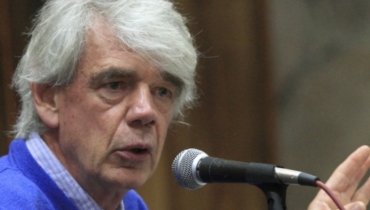“Hope explodes, volcanically, with rage.” It just so happens that John Holloway lives next door to a volcano in Puebla, Mexico, and can contemplate the aptness of the metaphor every day. “Revolutions for me are volcanic,” he says, “the burning lava is always just beneath the surface.”
John was in Forum Stadtpark early on Friday morning, sharing with a packed room his ideas about hope and crisis. I only have time here to share a tiny proportion of what he said, but the ideas fell like the Autumn rain outside.
John started by recalling recent expressions of popular revolution and rage, in Athens 2008, Oacaxa 2006, Istanbul 2012, Cairo 2011, Rio and Sao Paulo 2013. “Explosions of anger are at the same time explosions of hope,” he says. “People go out on the street and break windows because they actually believe things can be different. These expressions of hope are expressed, not in the long term building up of the Party, but in these volcanic expressions of rage.”
But there is a warning in the wind: Greece.
Greece has suffered the most terrible consequences of the crisis of capitalism, but at the same time it has the most militant anti-capitalist tradition in Europe. In Greece over the past few years, there has been action after action, protest after protest, against the imposition of austerity. And it hasn't made the slightest difference to the imposition of capitalist aggression on the people.
“Greece is a clash of hope on the one hand and the reality of crisis on the other,” John says. “Crisis hits struggle on the head and knocks it down. And, if that is the case, how on earth do we think about revolution? How on earth do we think about hope? How on earth do we think about radical change?”
“We need to re-learn hope, we need to think rage into hope,” John says. “It doesn't make any sense to say you shouldn't be angry – of course we should be angry!” But, starting from this rage, how do we think this rage into hope? For John, the answer comes from the Zapatista concept of digna rabia, dignified rage.
John returns to the inspiration for his opening speech: Ernst Bloch and his book 'The Principle of Hope'. Bloch says that our subjective hope has to find an echo within the world itself. In other words, the world has to respond to our hope – or, in John's words, “We have to find the hopeability of the world.”
“Across the world, we're getting the sense that we're banging our heads against the wall and we're getting no response.” For example, the millions-strong global anti-war demonstrations in 2003 drew zero response from governments, who went ahead with the invasion of Iraq. This is an enormous challenge for hope and our struggle. “When governments are so distant from society that there is no response there at all, how do we think about the hopeability of the world?” The question is open and increasingly urgent: How do we think about the possibility of change in the world?
During the rest of the workshop, John went on to discuss hope and historicity, crisis, debt and commonising – but your humble writer has not the space to share more! You'll have to find John himself or wait for the Elevate 2014 book, where I'll be able to explore John's ideas in much more depth.
Beginn des Seitenbereichs: Inhalt

Think Hope, Think Crisis
- Das war das Elevate Festival 2016
- Dungeon
- Dank an unsere Partner!
- Red Bull Music Academy Stage
- Musikkulturelle Scheuklappen und spätes Liebesbekenntnis zu 160BPM
- Die 3 Partnerfestivals auf einen Blick
- Cologne On Pop
- Elevate the Campus & Coding Workshop für AnfängerInnen
- Elevate kündigt Diskursprogramm an!
- Q&A mit Yannis Varoufakis
Ende dieses Seitenbereichs.
Springe zur Übersicht der Seitenbereiche.